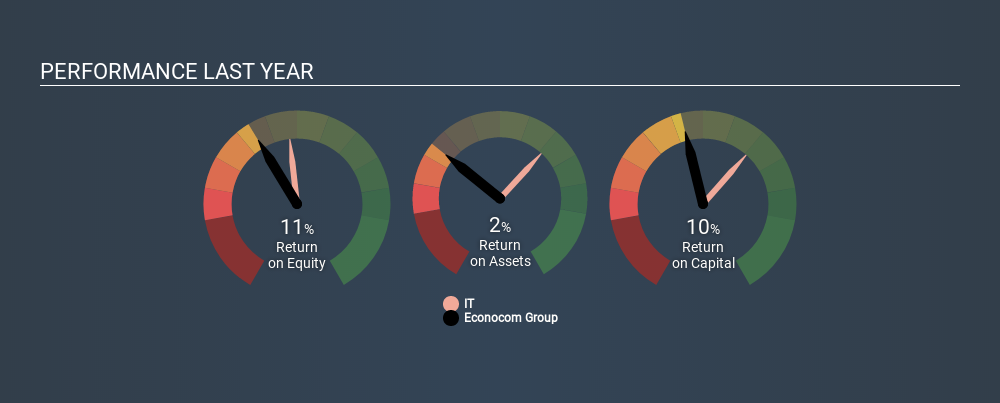Is Econocom Group SE’s (EBR:ECONB) 10% Return On Capital Employed Good News?

Today we'll look at Econocom Group SE (EBR:ECONB) and reflect on its potential as an investment. In particular, we'll consider its Return On Capital Employed (ROCE), as that can give us insight into how profitably the company is able to employ capital in its business.
First, we'll go over how we calculate ROCE. Then we'll compare its ROCE to similar companies. Then we'll determine how its current liabilities are affecting its ROCE.
Understanding Return On Capital Employed (ROCE)
ROCE is a measure of a company's yearly pre-tax profit (its return), relative to the capital employed in the business. Generally speaking a higher ROCE is better. Ultimately, it is a useful but imperfect metric. Author Edwin Whiting says to be careful when comparing the ROCE of different businesses, since 'No two businesses are exactly alike.
So, How Do We Calculate ROCE?
The formula for calculating the return on capital employed is:
Return on Capital Employed = Earnings Before Interest and Tax (EBIT) ÷ (Total Assets - Current Liabilities)
Or for Econocom Group:
0.10 = €124m ÷ (€3.0b - €1.8b) (Based on the trailing twelve months to June 2019.)
So, Econocom Group has an ROCE of 10%.
See our latest analysis for Econocom Group
Is Econocom Group's ROCE Good?
ROCE can be useful when making comparisons, such as between similar companies. It appears that Econocom Group's ROCE is fairly close to the IT industry average of 12%. Separate from Econocom Group's performance relative to its industry, its ROCE in absolute terms looks satisfactory, and it may be worth researching in more depth.
We can see that, Econocom Group currently has an ROCE of 10%, less than the 17% it reported 3 years ago. So investors might consider if it has had issues recently. The image below shows how Econocom Group's ROCE compares to its industry, and you can click it to see more detail on its past growth.

When considering ROCE, bear in mind that it reflects the past and does not necessarily predict the future. Companies in cyclical industries can be difficult to understand using ROCE, as returns typically look high during boom times, and low during busts. ROCE is, after all, simply a snap shot of a single year. What happens in the future is pretty important for investors, so we have prepared a free report on analyst forecasts for Econocom Group.
Econocom Group's Current Liabilities And Their Impact On Its ROCE
Current liabilities include invoices, such as supplier payments, short-term debt, or a tax bill, that need to be paid within 12 months. Due to the way ROCE is calculated, a high level of current liabilities makes a company look as though it has less capital employed, and thus can (sometimes unfairly) boost the ROCE. To check the impact of this, we calculate if a company has high current liabilities relative to its total assets.
Econocom Group has current liabilities of €1.8b and total assets of €3.0b. As a result, its current liabilities are equal to approximately 60% of its total assets. Econocom Group has a relatively high level of current liabilities, boosting its ROCE meaningfully.
The Bottom Line On Econocom Group's ROCE
This ROCE is pretty good, but remember that it would look less impressive with fewer current liabilities. Econocom Group shapes up well under this analysis, but it is far from the only business delivering excellent numbers . You might also want to check this free collection of companies delivering excellent earnings growth.
If you like to buy stocks alongside management, then you might just love this free list of companies. (Hint: insiders have been buying them).
If you spot an error that warrants correction, please contact the editor at editorial-team@simplywallst.com. This article by Simply Wall St is general in nature. It does not constitute a recommendation to buy or sell any stock, and does not take account of your objectives, or your financial situation. Simply Wall St has no position in the stocks mentioned.
We aim to bring you long-term focused research analysis driven by fundamental data. Note that our analysis may not factor in the latest price-sensitive company announcements or qualitative material. Thank you for reading.
About ENXTBR:ECONB
Econocom Group
Designs and develops digital solutions for public and private companies in Belgium and internationally.
Flawless balance sheet average dividend payer.
Similar Companies
Market Insights
Community Narratives



